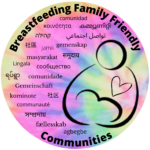Breastfeeding Family Friendly Community
The Breastfeeding Family Friendly Communities (BFFC) initiative is a community-wide program to impact Health Equity, as supported by the World Health Organization guidelines to work with communities to improve breastfeeding support services. The foundation of the initiative is the Ten Steps to a Breastfeeding Family Friendly Community (Ten Steps). Rather than providing lactation support directly to families, the Ten Steps Global Criteria with Approaches and Measures provide a Framework for local advocates to support the systems in the community in which families interact, such as the local hospital and healthcare community; WIC; Health Department; Chamber of Commerce and business owners; and childcare programs and school systems from birth to post-secondary. Each one of our partner communities, municipalities, cities, or towns works to bring together local stakeholders from diverse backgrounds, community groups, organizations, agencies, and institutions.
Stakeholders include everyone in the community! Families are stakeholders, too! Many families initiate breastfeeding in the hospital or birth center and want to continue to breastfeed after leaving the hospital. Yet, most discontinue breastfeeding in the first week or two after their infant’s birth. Families cite negative attitudes about breastfeeding and lack of safe, welcoming places to feed their infants in the community as reasons to discontinue. We all have a role in supporting families that choose to breastfeed.
What is our lens?
Equity is the lens through which we work! Breastfeeding/chestfeeding/human milk feeding offers the best start for an infant, providing needed immunological benefits for the infant’s still-not-mature immune system; protection from upper respiratory illnesses, ear infections, gastro-intestinal illnesses, such as, diarrhea or preterm necrotizing enterocolitis, and Sudden Infant Death Syndrome; and, of course, nutrition. Breastfeeding supports optimal development, and this best start continues beyond the one-to-two year age. In fact, these important benefits continue as long as the child is nursing. The benefits are not limited to the breastfeeding infant; there are physical and mental health benefits for the parent and family, too. Supporting a breastfeeding family friendly community really supports a healthier community!
These amazing benefits are available to all nursing infants; however, the support that families need to initiate and sustain lactation is not equitable. Black, Brown, and Indigenous families often receive less information and support starting in pregnancy and going through the birth of their infants and into the weeks and months after birth and beyond. Yet, we know that Black, Brown, and Indigenous families want to breastfeed, and their infants need this vital infant feeding for an optimal start!
We seek to build awareness within our communities of these inequities and ways to support our families to provide the optimal start and continued health for infants and their family, so that we can build a just, equitable, and supportive community. The initiative touches all the areas, all the places, in our community where families live, work, grow, and play. All of us are stakeholders in the health and well-being of our families. We look forward to working with you to build a “breastfeeding family friendly community” to ensure that families are able to provide the optimal start for their infants.
Join us!
For more information about joining the Breastfeeding Family Friendly Community initiative, contact: contact@breastfeedingcommunities.org or call 919-622-8787.
